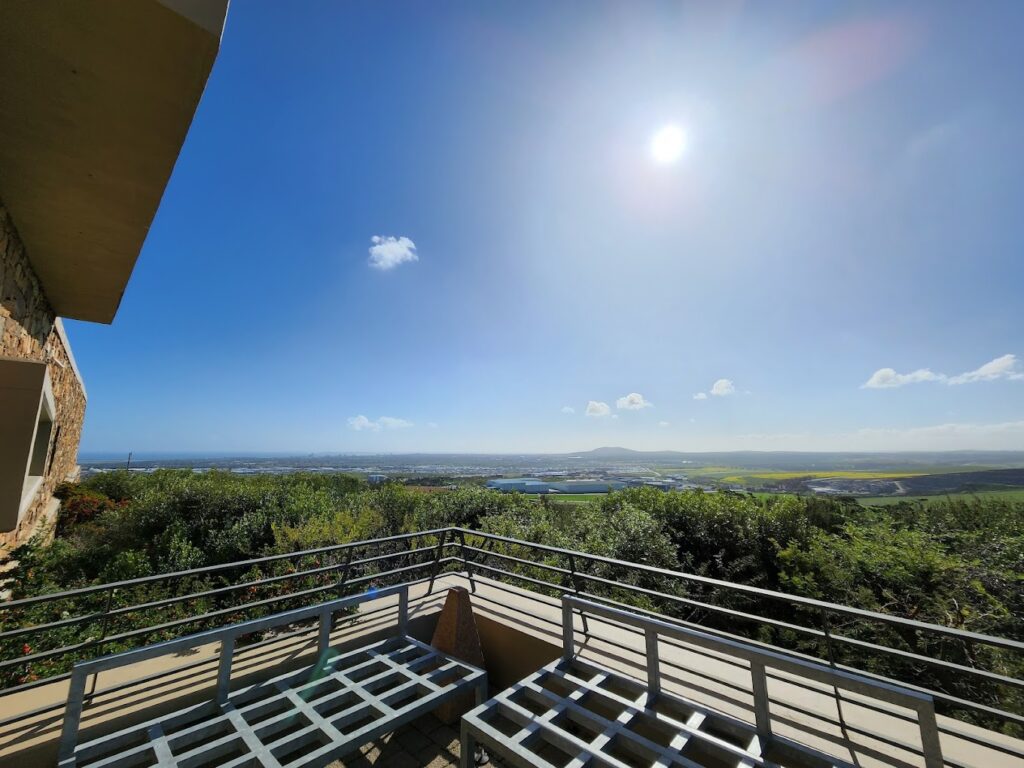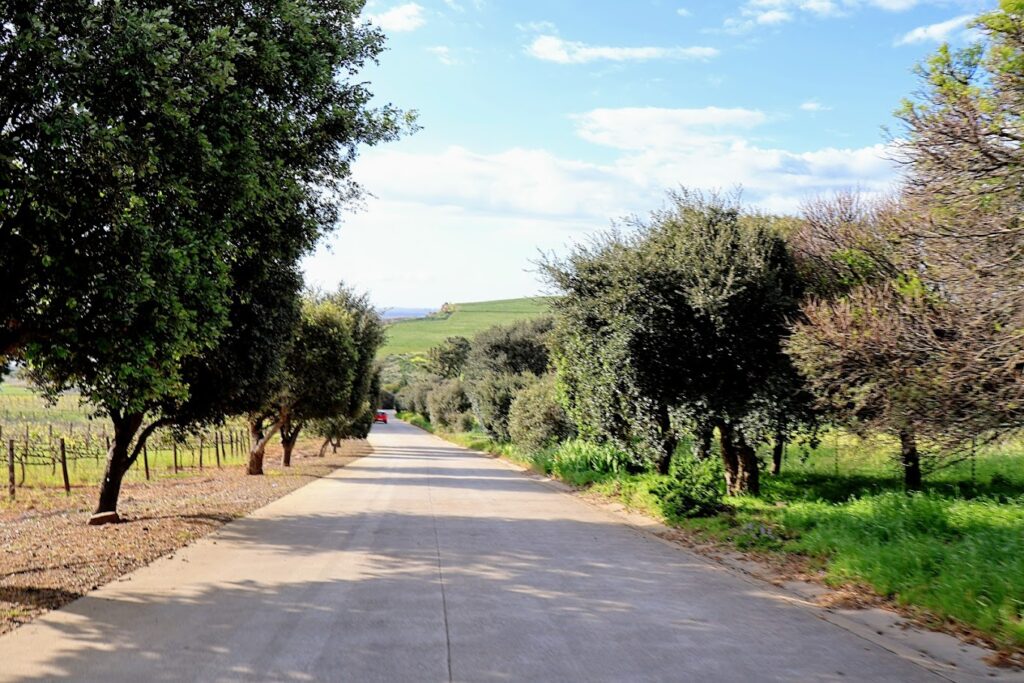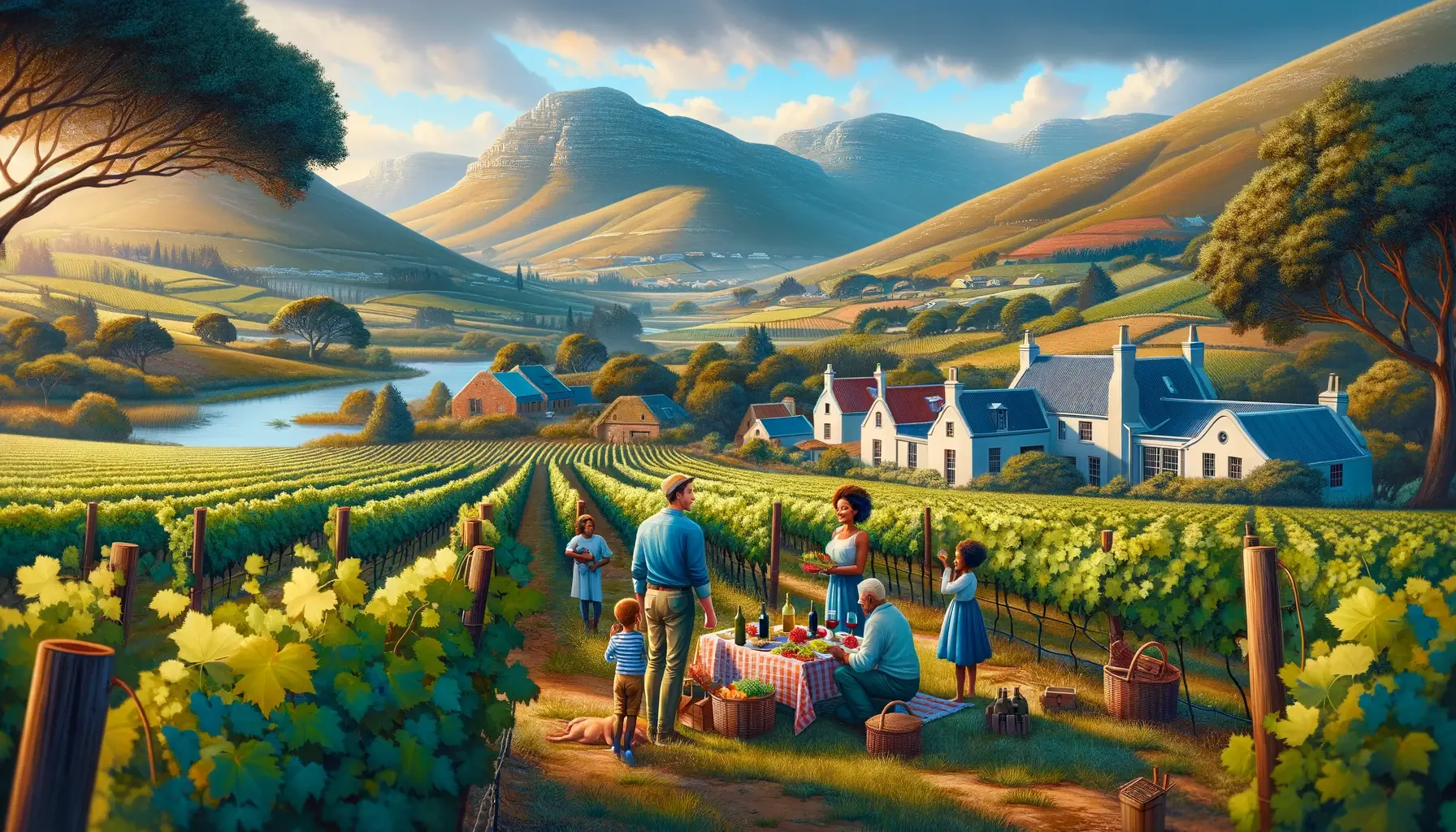Durbanville, a charming suburb in the Northern Suburbs of Cape Town, South Africa, is not just a destination in its own right but also a gateway to a range of nearby attractions. Known for its scenic vineyards, rich history, and family-friendly atmosphere, Durbanville offers a tranquil escape with easy access to various tourist hotspots. This comprehensive guide will delve into Durbanville’s allure and highlight other must-visit places in its vicinity
Best Time to Visit Durbanville:
- Spring (September to November): Ideal for outdoor explorations with vineyards in bloom.
- Autumn (March to May): Perfect for witnessing the grape harvest and cooler wine-tasting tours.
Top 20+ Places to Visit in Durbanville:
Durbanville, a picturesque suburb in the Northern Suburbs of Cape Town, South Africa, is known for its winelands, scenic beauty, and rich history. Here are some of the top places to visit in Durbanville:

- Durbanville Wine Valley: This is a must-visit for wine enthusiasts. The region is home to numerous award-winning wineries offering wine tastings, cellar tours, and beautiful vineyard views. Some notable estates include Durbanville Hills, Diemersdal, and Meerendal Wine Estate.
- Durbanville Nature Reserve: A beautiful area for nature lovers, offering walking trails, bird watching, and a serene environment to relax in. It’s a great spot for picnics and enjoying the indigenous flora.
- Tygerberg Nature Reserve: Located nearby, this reserve offers panoramic views of the city and coastline, hiking trails, and a rich diversity of flora and fauna.
- Rust-en-Vrede Gallery: Situated in a historic building, this art gallery showcases works by local artists and is a hub for the artistic community. It’s set in a beautiful garden and also hosts sculpture exhibitions.
- Durbanville Rose Garden: Home to over 500 different varieties of roses, the Durbanville Rose Garden is a picturesque spot, ideal for leisurely walks and photography.
- The Barnyard Theatre Willowbridge: For an evening of entertainment, visit this popular venue which offers a variety of shows, including music performances, plays, and comedy nights.
- Durbanville Golf Club: Golf enthusiasts can enjoy a round of golf at this well-maintained course, known for its beautiful setting and challenging layout.
- Altydgedacht: One of the oldest farms in the region, Altydgedacht offers a rustic and charming wine tasting experience, showcasing a range of excellent wines.
- Klein Roosboom Boutique Winery: Known for its unique wine tasting experiences in ‘caves’ created within the vineyards, this boutique winery is a delightful spot to visit.
- Durbanville Craft Market: For those interested in crafts, the Durbanville Craft Market offers a range of handmade items, perfect for souvenirs and gifts.
- Certainly! Durbanville is not just a suburb but a destination with a unique charm, offering a variety of experiences that cater to different interests. Here are a few more places and activities that make Durbanville a special place to visit:
- Phizante Kraal Wines: Nestled in the Tygerberg Hills, this winery offers a tranquil wine tasting experience with stunning views of the vineyards and surrounding landscape. It’s an ideal spot for those seeking a peaceful retreat.
- Durbanville Town Centre: The town center of Durbanville blends historic architecture with modern conveniences. It’s a great place to stroll around, with a variety of shops, cafes, and restaurants offering both local and international cuisine.
- Poplars Restaurant: Set in a beautiful garden, Poplars is a fine dining restaurant located on the D’Aria Wine Estate. It’s perfect for a romantic dinner or a special family gathering, offering exquisite meals paired with excellent wines.
- The Piano Bar: For a night out, The Piano Bar offers a lively atmosphere with live music, great cocktails, and a diverse menu. It’s a popular spot among locals and visitors alike.
- Bloemendal Wine Estate: This estate is known for its family-friendly environment, offering bike trails, a play area for children, and a delightful restaurant with stunning views.
- Durbanville Hills MTB Trails: For outdoor enthusiasts, the mountain biking trails around Durbanville Hills provide an adventurous experience with scenic routes suitable for various skill levels.
- Nitida Farmers Market: Held at the Nitida Wine Estate, this farmers market is a great place to sample local produce, artisanal foods, and crafts. It’s a wonderful way to spend a Saturday morning.
- Durbanville Heritage Society: For history buffs, the Durbanville Heritage Society offers insights into the area’s rich past. You can explore historical buildings and learn about the early days of Durbanville.
- Hillcrest Quarry: This unique venue hosts a range of events, from live music concerts to food and wine festivals. The quarry setting adds a distinctive touch to the events.
- Durbanville Community Church: An architectural landmark, this church is not only a place of worship but also a part of Durbanville’s history and community.
- Local Cafes and Bistros: Durbanville is dotted with charming cafes and bistros that offer a cozy atmosphere for enjoying a good book or a chat with friends over coffee and pastries.
- Whether it’s exploring the outdoors, indulging in culinary delights, enjoying local wines, or immersing in cultural experiences, Durbanville provides a well-rounded and enjoyable experience for visitors. Its blend of urban amenities and rural charm makes it a unique destination in the Cape Town area.
Nearby Tourist Places to Visit:
- Table Mountain National Park: A short drive to one of the world’s most iconic natural wonders, offering hiking, cable car rides, and stunning views of Cape Town.
- Bloubergstrand: Known for its pristine beaches and postcard-perfect views of Table Mountain across the bay.
- Stellenbosch: Explore the heart of the South African wine industry, with its historic vineyards, student culture, and vibrant art scene.
- Cape Town City Centre: Discover the rich history and modern culture of Cape Town, including attractions like the V&A Waterfront, District Six Museum, and Robben Island.
15+ Things to Do in Durbanville:
Durbanville is a destination that blends urban sophistication with a quaint country atmosphere. There’s a wide range of activities to suit various interests. Here are some things to do when visiting Durbanville:

- Wine Tasting: Durbanville is famous for its Wine Valley. The region is dotted with numerous award-winning wineries. Each estate offers unique wine tasting experiences, often coupled with stunning views and charming settings. Don’t miss out on visiting popular estates like Durbanville Hills, Diemersdal, and Meerendal.
- Explore Durbanville Nature Reserve: This reserve is a haven for nature lovers, offering walking trails, bird watching, and a serene environment. It’s a great spot for a peaceful hike or a picnic amidst nature.
- Golfing at Durbanville Golf Club: The club offers a beautifully maintained course that’s both challenging and rewarding for golf enthusiasts.
- Visit the Rust-en-Vrede Gallery: Situated in an old jailhouse, this art gallery showcases contemporary works by local artists. It’s a perfect spot for art enthusiasts.
- Dine at Local Restaurants and Cafés: Durbanville boasts a variety of dining options, from fine dining at sophisticated restaurants to casual cafes and bistros. Each offers a unique taste of local and international cuisine.
- Attend Events at The Barnyard Theatre Willowbridge: This popular venue hosts a range of entertainment options including live music performances, plays, and comedy shows.
- Enjoy the Durbanville Rose Garden: Home to an extensive variety of roses, the garden is ideal for leisurely walks, photography, and relaxation.
- Mountain Biking: For adventure seekers, the area around Durbanville offers some excellent mountain biking trails with picturesque views and routes suitable for different skill levels.
- Explore Local History: Visit the Durbanville Heritage Society to learn about the area’s history and explore historical buildings.
- Shopping: Enjoy shopping at local markets and boutiques where you can find everything from handmade crafts to high-end fashion.
- Relax at Hillcrest Quarry: This unique spot is not only a beautiful natural quarry but also a venue for events and concerts.
- Family Fun at Meerendal Wine Estate: With its open spaces, play area for kids, and delicious wine and food, it’s a perfect spot for family outings.
- Nitida Farmers Market: Held on weekends, it’s a great place to browse local produce, artisanal foods, and crafts.
- Cycling and Running Trails: The area is known for its scenic cycling and running trails, offering a great way to explore the natural beauty of Durbanville.
- Photography and Bird Watching: The natural beauty, vineyards, and historical architecture provide excellent opportunities for photography enthusiasts and bird watchers.
- Attend a Cooking Class or Wine Pairing Event: Some wine estates and culinary schools in the area offer cooking classes and wine pairing events, perfect for foodies.
Durbanville offers a mix of activities that cater to all ages and interests, making it a diverse and enjoyable destination. Whether you’re into outdoor adventures, cultural experiences, gastronomic delights, or simply relaxing in beautiful surroundings, Durbanville has something special to offer.
Major Attractions:
- Rust-en-Vrede Gallery: Showcasing contemporary South African art.
- Tygerberg Nature Reserve: A nature reserve with diverse flora and fauna, and hiking trails.
- Altydgedacht Wine Estate: One of the oldest estates in the region.
- Durbanville Golf Club: A beautifully manicured course offering a challenging game.
Foods to Eat in Durbanville
Durbanville, with its unique blend of countryside charm and urban sophistication, offers a variety of culinary experiences that cater to diverse tastes. Here’s a list of foods and dining experiences you should consider when visiting Durbanville:

- Wine Estate Dining: Many of the wine estates in Durbanville have excellent restaurants that offer fine dining experiences. These often feature locally sourced ingredients paired with estate wines. Look out for dishes like slow-roasted lamb, fresh salads with seasonal produce, and gourmet desserts.
- Traditional South African Braai: Enjoy a traditional South African braai (barbecue) at one of the local spots. It typically includes meats like boerewors (a type of sausage), steaks, and chicken, often served with pap (maize porridge) and chakalaka (spicy vegetable relish).
- Cape Malay Cuisine: Influenced by the culinary heritage of Malay slaves, Cape Malay dishes are rich in spices and flavors. Try dishes like bobotie (a spiced minced meat bake), bredie (slow-cooked meat and vegetable stew), and samosas.
- Seafood: Given its proximity to the coast, fresh seafood is a must. Enjoy local specialties like grilled snoek (a local fish), calamari, and prawns.
- Farmers’ Markets Delights: Visit the local farmers’ markets where you can enjoy freshly baked artisan bread, homemade cheeses, and a variety of local delicacies.
- Biltong and Droëwors: These are traditional South African dried meats, similar to jerky, and are a popular snack. They come in various flavors and are great for nibbling on while wine tasting.
- Gourmet Pizzas and Burgers: Many local eateries and wine farms offer gourmet pizzas with unique toppings, and delicious, hearty burgers, often with a local twist.
- Artisanal Coffee and Pastries: The cafes in Durbanville serve excellent artisanal coffee along with a range of pastries, cakes, and other sweet treats.
- Picnic Baskets: Some wine estates offer pre-arranged picnic baskets. Enjoy a relaxed outdoor meal in beautiful vineyard settings.
- Contemporary Fusion Cuisine: There are restaurants that offer contemporary menus, combining international trends with local flavors.
- Wine Pairings: Indulge in wine pairings where local wines are matched with a variety of foods like chocolates, cheeses, and even ice cream.
- Craft Beer and Brewpub Fare: Explore local craft breweries in and around Durbanville, where you can enjoy a range of craft beers paired with pub-style food.
Whether you’re looking for a sophisticated dining experience, traditional local flavors, or casual eats, Durbanville offers a diverse culinary landscape that’s sure to delight your palate.
Accommodation and Culinary Scene:
- Diverse Accommodations: From boutique guesthouses to family-friendly B&Bs.
- Dining Options: Savor culinary delights at winery restaurants or local eateries in town.
Travel Tips:
- Transportation: Renting a car is advisable for exploring both Durbanville and nearby attractions.
- Safety Measures: Durbanville is generally safe, but standard safety practices should be observed.
Engaging with the Community:
- Local Festivals and Markets: Experience local culture and traditions at various events and markets.
History of Durbanville
Durbanville has a rich and fascinating history that dates back to the early 19th century. Here’s an overview of its historical development:
- Early Settlements: The area that is now known as Durbanville was originally inhabited by the Khoi people. European settlers began to arrive in the area in the late 17th and early 18th centuries.
- Establishment of a Village: Durbanville began as a watering station for travelers between Cape Town and the interior. It was initially known as Pampoenkraal (Pumpkin Corral), named after a local farming practice of the time.
- Church and Community Development: The growing community felt the need for a church, which led to the establishment of the Dutch Reformed Church in 1825. This played a pivotal role in the development of the village, as it often did in South African towns. The village that grew around the church was renamed Durbanville in 1886, in honor of Sir Benjamin D’Urban, then governor of the Cape Colony.
- Agricultural Expansion: The fertile soil and favorable climate of the region allowed for flourishing agriculture. Vineyards and wheat farms were established, and the area became known for its quality wines and produce.
- The 20th Century and Urbanization: Durbanville remained a relatively small community until the mid-20th century. Post World War II, the area began to urbanize rapidly, transforming from a rural community into a sought-after suburb of Cape Town.
- Wine Industry Growth: The wine industry in Durbanville gained prominence, and the area is now renowned for its wine route featuring several prestigious wineries. The unique terroir of the region contributes to the production of high-quality wines.
- Preservation of Heritage: Despite its growth and development, Durbanville has retained much of its historical charm. Efforts have been made to preserve important buildings and landmarks, including the Dutch Reformed Church, old houses, and the local museum which showcases the area’s history.
- Modern Development: Today, Durbanville is a vibrant suburb that blends its historical heritage with modern amenities. It is known for its excellent schools, shopping centers, and residential estates, as well as its natural beauty and wine farms.
Durbanville’s history is a microcosm of the broader South African narrative, featuring a mix of indigenous heritage, colonial influence, agricultural development, and modern urbanization. This rich history adds to the suburb’s unique character and appeal.
Durbanville, with its serene vineyard landscapes and rich cultural tapestry, is a perfect starting point for exploring the diverse attractions around Cape Town. Whether indulging in wine tours, engaging in outdoor activities, or exploring nearby tourist spots, Durbanville and its surroundings promise a memorable South African adventure.
